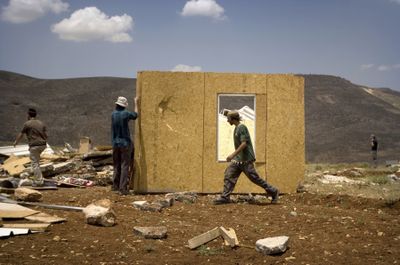Israeli police raze West Bank settlement, renewing backlash

KOCHAV HASHAHAR, West Bank – The Israeli border police waited till the morning Torah reading was over. Then, after six Jewish families were given time to remove their possessions, a pair of front-end loaders pounded their modest dwellings into twisted wrecks on a bare plateau overlooking the Jordan Valley.
A few young men climbed atop a makeshift synagogue nearby, intent on resisting, but scrambled to safety before it, too, was demolished. By afternoon, however, the tiny Jewish outpost in the West Bank was humming with electric drills, saws and orders for building materials shouted into cell phones, a rebuilding attempt that defies Israel’s right-leaning government and the U.S.
As the Obama administration endeavors to revive a Middle East peace process, no issue in its relationship with Israel is more problematic than the growth of Jewish settlements on West Bank land claimed by the Palestinians for a future state. In Thursday’s struggle over the outpost of Maoz Esther, Israel took Washington’s side but stirred a settler backlash that underscores a rift between the two allies.
Since Israel captured the West Bank and other territories in the 1967 Middle East War, U.S. administrations have viewed the settlements and smaller outposts as an obstacle to peace. U.S. officials say President Barack Obama wants to show that he can force Israel to halt settlement growth to build support in the Arab world for Israeli-Palestinian peace talks and an alliance against Iran’s nuclear ambitions and rising regional influence.
Netanyahu opposes freeze
Meeting at the White House with Israeli Prime Minister Benjamin Netanyahu on Monday, Obama said bluntly, “settlements have to be stopped.” To Netanyahu, the issue is political and practical. In Washington he rebuffed the administration’s call for a freeze on settlement growth, in part because right-wing parties in his coalition speak for most of the estimated 280,000 Jewish settlers, those who reject Palestinian statehood and limits on Israel’s occupation of the West Bank.
Also, he knows that a freeze would stifle the growth of Israel’s 121 established West Bank communities. Already he is under pressure from settler leaders to ease restrictions on such growth so that young adults in those communities can marry and build near their parents’ homes.
Thursday’s police action represents something the U.S. and Israeli officials say they agree on: the inadmissibility of some 100 outposts scattered across the territory. While Israel rejects the near-universal contention that its established settlements violate international law, it does not formally recognize the smaller outposts, which are home to several thousand Jews.
Israeli officials said that after returning from Washington on Wednesday, Netanyahu met with Defense Minister Ehud Barak and they agreed to take down several outposts in the coming weeks.
Maoz Esther, just outside the settlement of Kochav Hashahar and northeast of the Palestinian city of Ramallah, was the first outpost targeted since the government took office at the end of March.
Called ‘relations stunt’
Settler leaders, reacting furiously, saw a political message. “This is an announcement of intentions, for the whole world to see what the United States wants Israel to do,” Avi Roeh, chairman of the local settler council, told Israel Radio.
Netanyahu’s Israeli critics on the left dismissed the demolition as a symbolic move that did not prove his willingness to act decisively against the outposts.
“If they really want to deal with the problem of illegal outposts, they should deal with the significant outposts,” said Yariv Oppenheimer, a leader of the Peace Now organization, which opposes settlements’ existence.
Tearing down Maoz Esther, a scattered collection of two concrete structures and several cabins fashioned from metal shipping containers, is “just a public relations stunt,” he said.
But the tiny outpost refused to vanish, and its rebuilding effort raised questions about the government’s ability to enforce a wider crackdown. Israel’s previous government tore it down in March, but residents rebuilt. “We will build this again,” said Avraham Sandak. “They keep wrecking it and we keep rebuilding.”